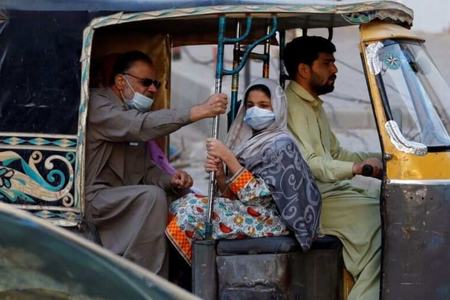ISLAMABAD/RAWALPINDI: As the government pursues the strategy of linking various facilities to vaccination, beginning with the air travel bar from next week and a warning related to restriction on mobile phone use, Special Assistant to Prime Minister on Health Dr Faisal Sultan on Tuesday urged the people to get their jabs at the earliest to avoid harsh measures, announcing that the authorities were aiming at the target of one million shots a day.
While the National Command and Operation Centre (NCOC) data showed over 3,000 Covid-19 cases for a second consecutive day with 39 more deaths and 3,262 new cases in past 24 hours, the number of active cases in the country swelled to 59,899 on July 27.
Terming Karachi’s situation where the positivity rate of coronavirus has surged to 26.32 per cent ‘the worst till date’, the NCOC in a meeting noted that number of Covid patients in intensive care units in the metropolis had already increased to 980. The federal government vowed to cooperate with the Sindh government and provide personal protective equipment and oxygen to deal with the situation.
In a related development, spokesperson for the Ministry of National Health Services Sajid Shah confirmed to Dawn that three million more doses of Sinopharm arrived from China on Tuesday.
However, the NCOC meeting, which was chaired by Minister for Planning, Development and Special Initiatives Asad Umar, highlighted the need for strict implementation of Covid-related standard operating procedures in Karachi.
The Sindh and Punjab governments have earlier warned the unvaccinated people that their SIMs can be blocked if they did not get their shots. “Nowadays people can spend a whole day if their wallets are left at home, but they become completely paralyzed if their cell phones are misplaced or SIMs are blocked for a single day. Though such proposals and ideas [like blocking SIMs] are discussed at the platform of NCOC, I would urge people to get them vaccinated at the earliest,” the PM’s aide on health said while talking to Dawn.
Dr Sultan added that the federal government was gradually following the approach of incentives and obligations to convince maximum people to get themselves vaccinated. In this regard, he mentioned that air travel of unvaccinated people would be banned from August 1.
Following the NCOC directive, the national flag carrier Pakistan International Airline (PIA) has made it mandatory for domestic passengers aged 18 or above as well as its own cabin crew to submit copy of their vaccination certificates (complete or partially vaccinated) to qualify for air travel.
Also, the PIA management imposed restrictions on cabin crew members to go to duty-free shops due to Covid protocols on all stations, warning that in case of violation the amount of penalty will be deducted from their salary along with administrative action as per rules.
Dr Sultan told Dawn that the government was engaging the corporate sector to boost vaccination efforts. “Currently around 600,000 people are being vaccinated per day which is a huge number but still the NCOC wants to enhance it to one million doses per day. We are involving the corporate sector to get their employees and families of the employees vaccinated. We are also establishing vaccination centres in business centres so that a large number of people would be vaccinated,” he said.
He said the NCOC was focusing 15 largest cities that had become hub of virus to intensify vaccination campaign. He believed that 40pc vaccine-eligible population of the 15 cities would be vaccinated by August 31.
Earlier, at the launch of the Centre of Disease Control (CDC) at the National Institutes of Health (NIH), Islamabad, the PM’s aide expressed the hope that the initiative would contribute to improve country’s ability to prevent, detect and respond to infectious disease outbreaks in a systematic manner and also enhance national health safety and security.
Speaking on the occasion, NIH Executive Director Maj Gen Aamer Ikram said the CDC would improve the public health system capacity for early detection of events having public health significance for timely response using modern methods and techniques.
Chairman of the Health Task Force, Pakistan, Prof Nausherwan Khan Burki was also present on the occasion.
Published in Dawn, July 28th , 2021




































